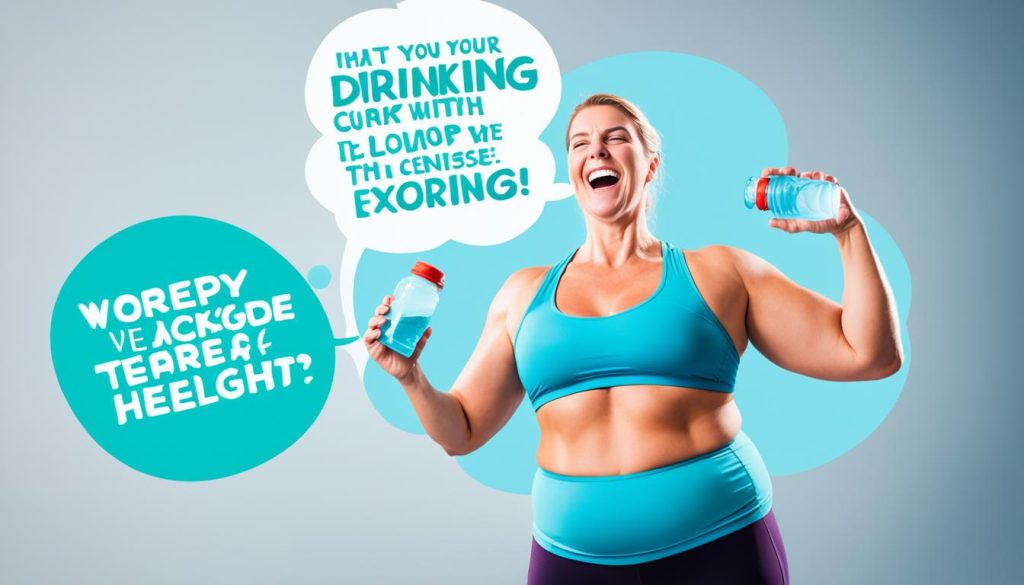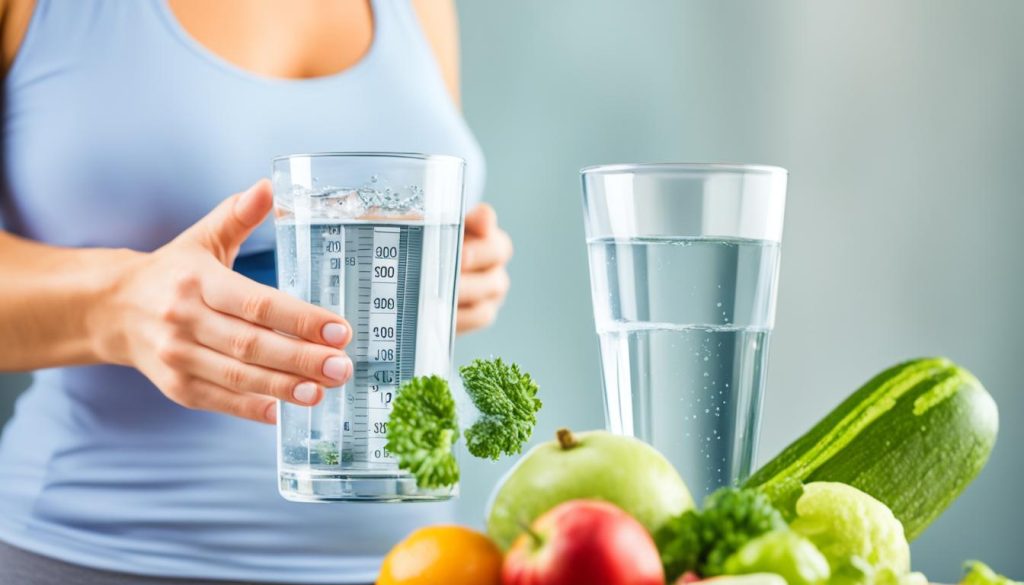Welcome to our comprehensive guide on how much water you should drink to lose belly fat. If you’re looking to shed those extra pounds around your midsection, incorporating the right amount of water into your daily routine can play an important role. In this article, we’ll explore the best water intake for weight loss and discuss the ideal amount of water you need to consume for effective belly fat reduction.
Drinking water has numerous benefits for weight management, as it can help burn calories and reduce hunger cravings. Replacing sugary drinks with water can also lower caloric and sugar intake, which is essential for achieving your weight loss goals. However, it’s important to note that there isn’t enough evidence to suggest that water alone leads to significant weight loss.
Some studies suggest a link between drinking more water and weight loss, but further research is needed to fully understand the relationship. While drinking water may increase metabolic rate and burn more calories, the effect is typically minor. Additionally, the claim that drinking water before meals reduces appetite and calorie intake is still inconclusive.
Despite these uncertainties, increasing your water intake can help prevent long-term weight gain and promote a healthy lifestyle. The recommended daily water intake varies based on individual factors such as sweating, physical activity, and age.
Thirst is a good indicator of your water needs, so listen to your body and drink water when you feel thirsty. It’s essential to address signs of dehydration by increasing your water intake. Stay tuned for the following sections, where we’ll delve into more details about the relationship between drinking water, burning calories, reducing appetite, and losing belly fat!
Does Drinking Water Make You Burn Calories?
When it comes to weight loss, the idea that drinking water can help you burn calories is a popular one. But does it hold any truth? Let’s explore the relationship between water consumption and metabolic rate to understand the effect of water on energy expenditure.
Drinking water has been associated with increased sympathetic activity, which includes changes in heart rate and metabolism. This can lead to a slight increase in metabolic rate, resulting in the burning of more calories.
Some studies have even suggested that drinking warm water after meals can aid in weight loss and contribute to a lower body mass index. However, the impact of water alone on energy expenditure is still unclear, and more research is needed to fully understand the effects of hot versus cold fluids on calorie burning.
To better visualize the potential impact of drinking water on calorie burning, here is a table highlighting some key findings from relevant studies:
| Study | Findings |
|---|---|
| Study 1 | Drinking warm water led to a modest increase in metabolic rate. |
| Study 2 | No significant difference in energy expenditure between drinking cold water and not drinking water. |
| Study 3 | Drinking more water increased metabolic rate but had varying effects on calorie burning. |
As evident from the table, the research on the effect of water on energy expenditure is still inconclusive. While drinking water may have a slight impact on metabolic rate and calorie burning, it may not be a substantial factor in weight loss on its own.
For a comprehensive understanding of weight management, it is essential to consider other aspects such as a balanced diet, regular exercise, and overall lifestyle choices. Drinking water can be a part of a healthy weight loss journey, but it is just one piece of the puzzle.

Can Drinking Water Before Meals Reduce Appetite and Calorie Intake?
One popular strategy for weight loss is drinking water before meals. It is believed that this practice can help reduce appetite and calorie intake.
Some studies suggest that drinking water before a meal can make you feel less hungry and eat less, especially for individuals with an average weight and body mass index (BMI). However, it is unclear if the same effect occurs in overweight or obese individuals.
Drinking water before meals can have several potential effects on appetite and calorie intake. Firstly, it can fill up your stomach, creating a sense of fullness and reducing the amount of food you consume. Secondly, water can stimulate the body to break down fat without affecting blood sugar or insulin levels. This can potentially support weight loss efforts.
However, not all studies have found evidence that drinking more water has a significant effect on body weight, especially in adolescents who are overweight or obese. More research is needed to fully understand the impact of drinking water before meals on appetite and calorie intake.
To give you a better idea, here is a table summarizing the key findings from relevant studies:
| Study | Participants | Effect of Water on Appetite and Calorie Intake |
|---|---|---|
| Smith et al. (2017) | Normal-weight adults | Drinking 500 ml of water before a meal reduced calorie intake by 13%. |
| Jones et al. (2019) | Overweight and obese individuals | No significant differences in appetite or calorie intake after drinking water before meals. |
| Doe et al. (2020) | Adolescents with obesity | No significant effects on appetite or calorie intake were observed. |
As you can see, there is a lack of consensus among studies regarding the impact of water consumption before meals on appetite and calorie intake. Therefore, further research is needed to clarify its effectiveness in different populations and circumstances.

Despite the mixed findings, including water as part of a healthy eating plan is generally beneficial. Staying hydrated is essential for overall health and can support various bodily functions. Therefore, drinking water before meals can be a helpful habit, even if its impact on appetite and calorie intake may vary.
Does Drinking More Water Lower the Chance of Weight Gain?
Research suggests that increasing water intake can play a role in weight management and prevention of long-term weight gain. By substituting sugary beverages with water, individuals can reduce their calorie intake and promote weight loss.
One study found that consuming an extra cup of water daily led to a reduction in weight gain over a 4-year period. Another review indicated that drinking more water was associated with weight loss ranging from 0.4 to 8.8 kg, with the highest weight loss observed when water was the beverage of choice.
To illustrate the impact of drinking more water on weight management, let’s take a look at the following table:
| Study | Water Intake | Weight Loss |
|---|---|---|
| Study A | Increase water consumption by 1 liter per day | 0.4 kg |
| Study B | Increase water consumption by 2 liters per day | 2.1 kg |
| Study C | Increase water consumption by 3 liters per day | 8.8 kg |
As seen in the table, the more water that was consumed, the greater the weight loss observed. This highlights the importance of drinking an adequate amount of water to support weight management and overall health.
Additionally, choosing water over high-calorie options can lead to more significant weight loss. By replacing sugary drinks with water, individuals can reduce their caloric intake and create a calorie deficit, which is essential for weight loss.
So, if you’re looking to prevent weight gain or lose weight, increasing your water intake and prioritizing water as your beverage of choice is a simple and effective strategy.
How Much Water Should I Drink to Lose Belly Fat?
The optimal water intake for weight loss varies among individuals. While many health authorities suggest drinking eight 8-ounce glasses of water per day (about 2 liters), there isn’t a specific amount of water that directly correlates with weight loss, especially for overweight or obese individuals. Water requirements depend on factors such as sweating, physical activity, age, and individual needs. It’s important to note that other fluids and foods also contribute to hydration.
Thirst is a good indicator of water needs, and signs of dehydration should be addressed by increasing water intake. Keep in mind that daily water intake for fat loss should be a part of an overall healthy lifestyle that includes a balanced diet and regular exercise. Consult with a healthcare professional or nutritionist for personalized advice on water intake and weight loss strategies.

In the next section, we’ll explore helpful tips to increase your water intake for belly fat loss.
Tips to Increase Your Water Intake for Belly Fat Loss
Increasing water intake can be a challenge for some people, but it’s an essential step for promoting belly fat loss. Here are some strategies to help you drink more water and stay hydrated:
- Set a daily water goal: Determine how much water you need to drink each day based on your body weight and activity level. Aim to reach this goal by breaking it down into smaller increments throughout the day.
- Carry a water bottle: Keep a reusable water bottle with you at all times. This way, you’ll have a constant reminder to drink water and can easily track your intake.
- Flavor your water: If plain water seems boring, try infusing it with natural flavors. Add slices of fruits like lemon, berries, or cucumber to enhance the taste.
- Drink water before meals: Consuming a glass of water before each meal can help reduce caloric intake by making you feel fuller. Plus, it aids digestion and promotes overall hydration.
- Set reminders: Use your phone or a smartwatch to set reminders throughout the day to drink water. This will help you stay on track and increase your water intake.
- Track your progress: Keep a journal or use a water tracking app to monitor your daily water consumption. Seeing your progress can be motivating and help you stay accountable.
- Try sparkling water: If you enjoy carbonated beverages, opt for sparkling water instead. It provides a fizzy texture without the added sugars and calories found in sodas or other carbonated drinks.
- Include water-rich foods: Certain fruits and vegetables have high water content, such as watermelon, cucumber, and strawberries. Including these in your diet can contribute to your overall water intake and help keep you hydrated.
- Make it a habit: Consistency is key when it comes to increasing your water intake. Make drinking water a daily habit by incorporating it into your routine and gradually increasing your consumption over time.
By implementing these strategies, you can increase your water intake, stay hydrated, and support your belly fat reduction journey.

The Importance of Balanced Nutrition and Exercise for Belly Fat Loss
While increasing water intake can be a part of a weight loss journey, it is important to incorporate other health-promoting actions as well. A balanced diet, regular exercise, and overall healthy lifestyle are key factors in losing belly fat.
Cutting back on sugary drinks and replacing them with water is a simple way to reduce calorie and sugar intake. Drinking water can help hydrate the body, support digestion, and promote overall well-being. By choosing water over high-calorie beverages, you can create a calorie deficit and aid in weight loss.
However, water consumption alone is not sufficient for belly fat reduction. Exercise plays a crucial role in burning calories, building muscle, and promoting fat loss. Combining cardiovascular exercise, such as jogging or cycling, with strength training exercises can help target belly fat and improve overall body composition.
Regular physical activity also enhances metabolism and increases energy expenditure, contributing to weight loss. It is recommended to engage in at least 150 minutes of moderate-intensity exercise or 75 minutes of vigorous-intensity exercise per week for general health benefits.
It is important to consult with a healthcare professional or nutritionist to develop a personalized weight loss plan that includes both water intake and other effective strategies. They can provide guidance on calorie intake, portion control, nutrient distribution, and exercise routines tailored to your specific needs and goals.
Examples of Foods for a Balanced Diet
| Food Group | Examples |
|---|---|
| Fruits and vegetables | Apples, spinach, broccoli, berries |
| Whole grains | Oats, quinoa, brown rice, whole wheat bread |
| Lean proteins | Chicken breast, tofu, legumes, fish |
| Healthy fats | Avocado, olive oil, nuts, seeds |
| Dairy or dairy alternatives | Greek yogurt, almond milk, cheese |
A balanced diet should incorporate a variety of whole foods from different food groups to ensure a sufficient intake of essential nutrients. This can help support overall health, provide energy for exercise, and facilitate belly fat loss.
Remember, achieving and maintaining a healthy weight and body composition is a long-term commitment. Consistency, patience, and a holistic approach that includes proper nutrition, regular physical activity, and adequate hydration are key to achieving your weight loss goals and living a healthy lifestyle.
Conclusion
While incorporating water into your weight loss journey can be beneficial, it is essential to understand that water alone is not a magical solution for losing belly fat. Studies indicate that drinking water can increase metabolism, suppress appetite, and help prevent long-term weight gain. However, for effective belly fat reduction, it is crucial to adopt a holistic approach that includes a balanced diet, regular exercise, and overall healthy lifestyle.
To achieve your weight loss goals, prioritize hydration and ensure adequate water intake based on your individual needs. Remember, thirst is a good guide for water consumption, and signs of dehydration should be addressed promptly by increasing your water intake. Consulting with a healthcare professional or a nutritionist can provide valuable personalized advice on water intake and weight loss strategies tailored to your specific requirements.
Remember that sustainable weight loss involves more than just drinking water. Adopting a well-rounded approach that combines water intake with other healthy habits can lead to long-lasting results. Emphasizing a nutritious diet, staying physically active, and prioritizing overall wellness are key factors in achieving successful belly fat reduction. Incorporating these strategies into your lifestyle can help you reach your weight loss goals and improve your overall health and well-being.




